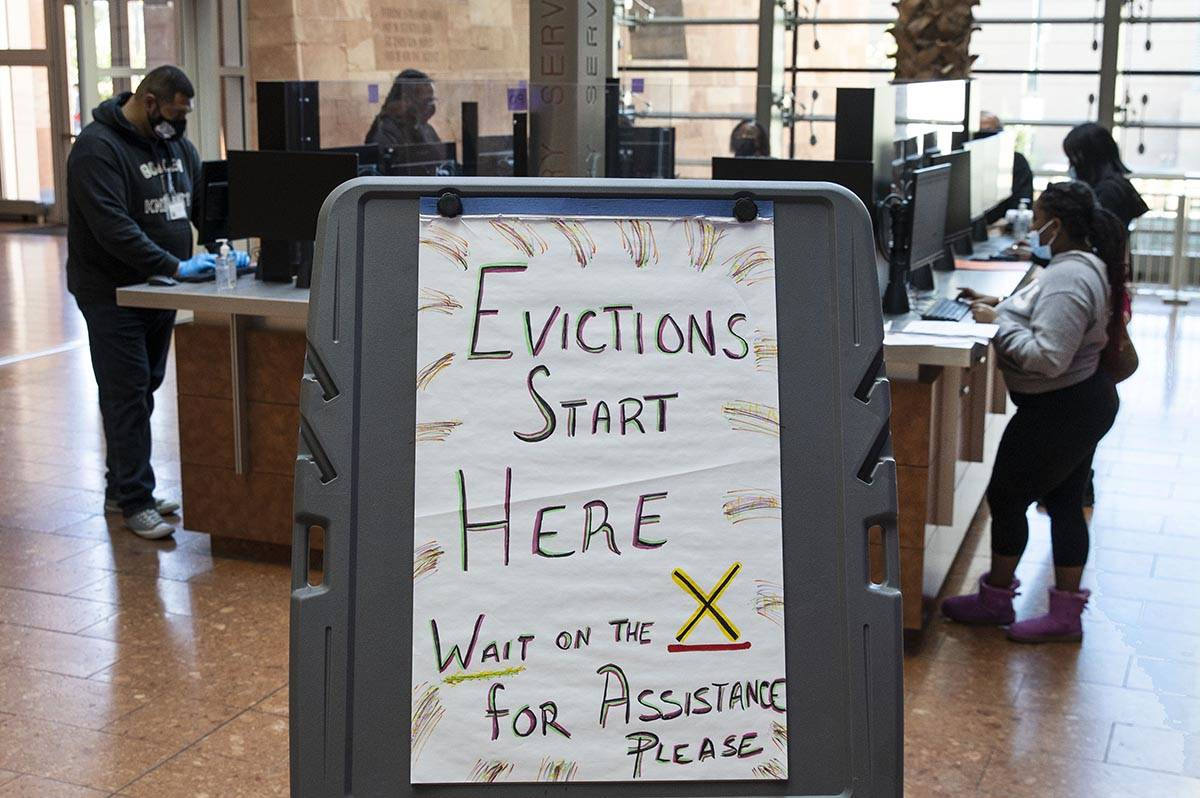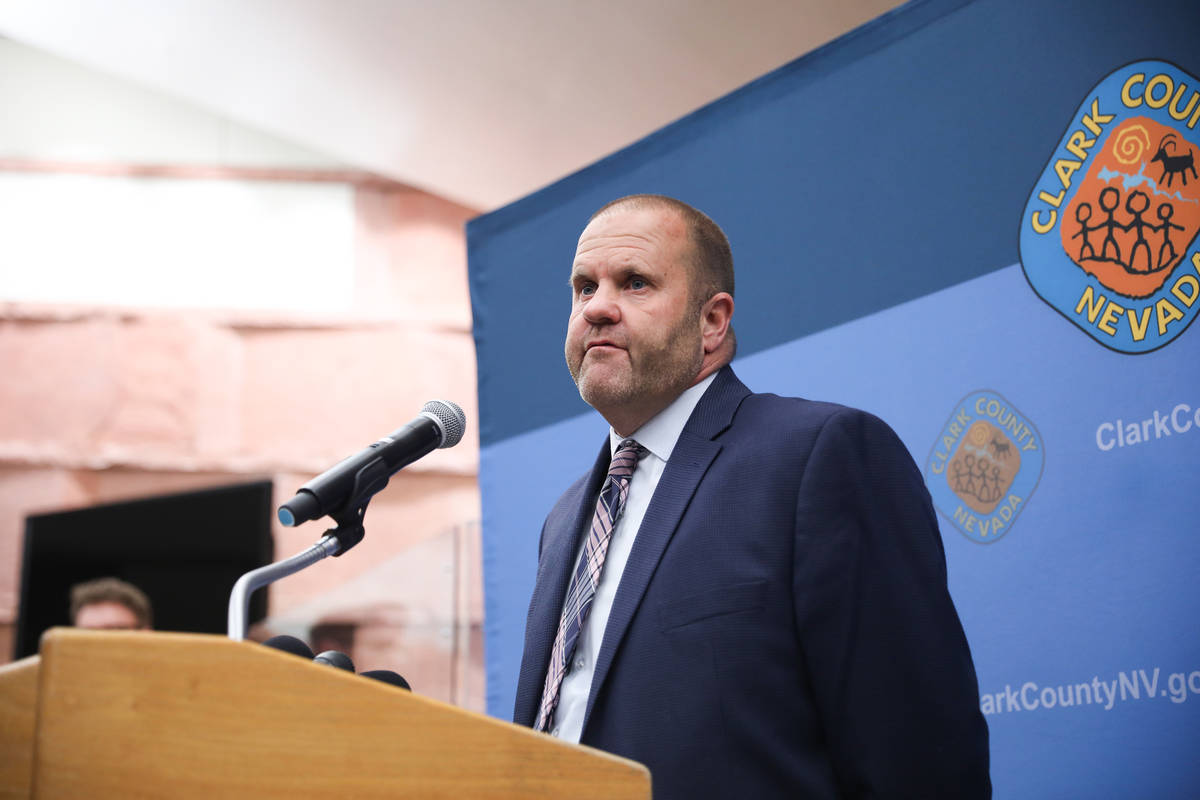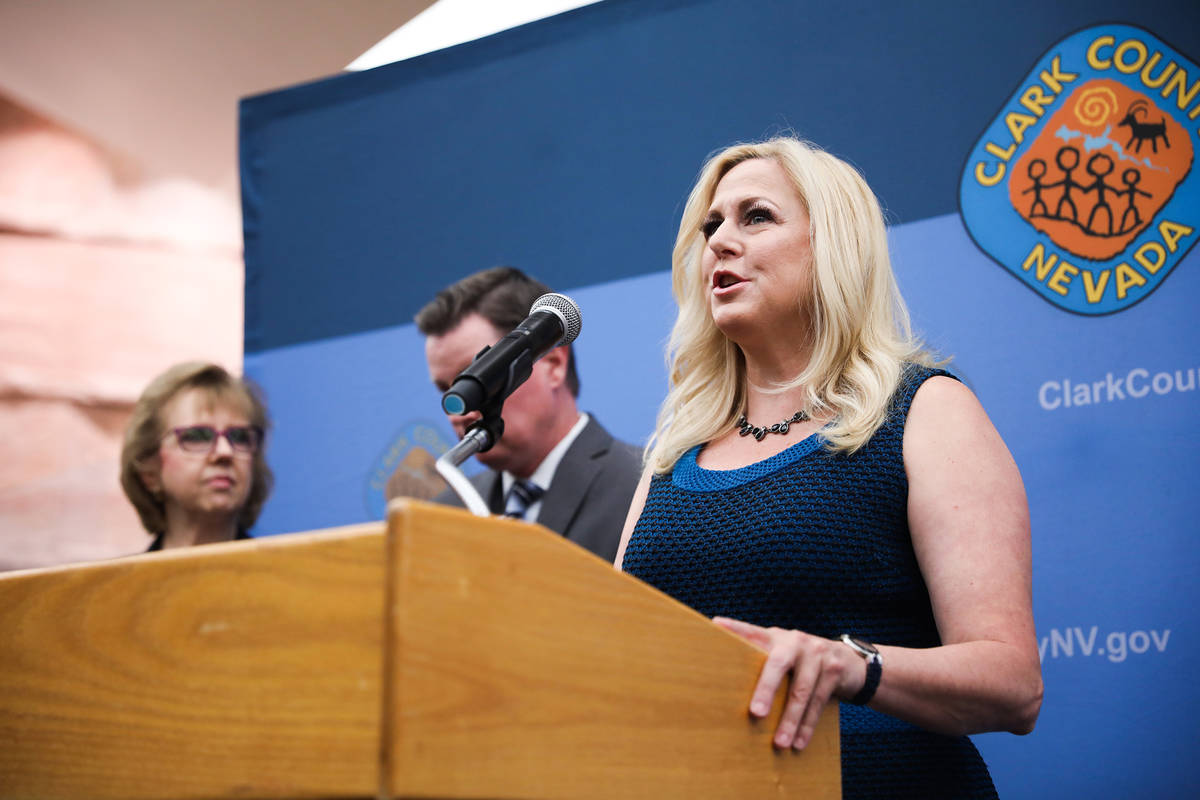In coordinated effort, Nevada officials face eviction crisis
State and local officials came together Thursday to publicize ongoing coordination to assist struggling residents at risk of eviction, a looming crisis that has been delayed by federal and state protections through much of the pandemic.
But with the federal ban scheduled to end June 30, and a state moratorium set to expire at the end of this month, officials sought to alert tenants of available options.
“We know that the next 12 months will be the hardest time for many of our families that are just now getting back to work,” Clark County Commission Chairwoman Marilyn Kirkpatrick said.
During a news conference from commission chambers, officials unveiled The Southern Nevada Eviction Prevention Program, which appears to be an umbrella term for ongoing coordination between the county’s social services department, courts, the state, nonprofits and neighboring cities.
Officials emphasized that tenants, if eligible, should sign a Centers for Disease Control and Prevention declaration form and provide it to their landlord or property manager to qualify for federal protection.
If a tenant is served with an eviction notice, they should file a response with their local Justice Court and choose mediation.
“Now it doesn’t always result in a positive result … but it provides a neutral platform for the parties to come together to explore all the options that are available to them,” said Nevada Labor Commissioner Shannon Chambers, who is also president of Home Means Nevada, the agency administering the state’s rental eviction mediation program.
Chambers said the program has processed over 1,000 cases since it was implemented in October, working with the courts, landlords, tenants and the Legal Aid Center of Southern Nevada. More than 100 mediators have been hired to handle an expected surge in cases beginning July 1.
Examples of available options that might be revealed during mediation include rental and/or unemployment assistance, or agreements between a tenant and landlord to reduce rent or something else, according to Chambers.
Housing assistance key
The county is notified when a tenant files an eviction answer with a Justice Court, leading to a case worker reaching out to the tenant to walk them through available resources including the county’s housing assistance program, CHAP.
That program has become a central piece of the county’s effort to respond to the many whose income had been lost or deeply cut due to statewide shutdowns throughout the public health crisis.
During its first round of funding, through last year’s CARES Act, the program administered $92 million in assistance. It is expected to pay out $160 million in a second round this year, according to Assistant County Manager Kevin Schiller, and even more with an upcoming third iteration backed by President Joe Biden’s American Rescue Plan.
Schiller said the county believes it will assist 60,000 households — a conservative figure that does not factor in upcoming rescue plan funds. Even so, he said the county is aware that some 125,000 households in the region could be at risk for eviction, citing a third-party study.
Demand sky high
While high demand for the program has outpaced the program’s ability to process applications, Schiller claimed it had become more efficient. The county used federal dollars to boost its technology and added nearly 100 temporary staff to support it, bringing the total of workers on the program to almost 300, he said.
There had been up to 20,000 applicants in the queue at one point, Schiller said, and now the wait list is roughly 9,000.
But county officials were peppered with questions by reporters who had heard from applicants complaining about long wait times. Kirkpatrick acknowledged that her office receives a “ton of calls” too.
While the housing program’s website warns that “extreme demand” has caused wait times of more than four weeks to process applications, Tim Burch, the county’s human services administrator, said that wait times had improved to “weeks” instead of stretching into months as they had in December.
But county officials also declined to give the specific range of wait times they were seeing, despite analyzing them regularly, saying that the wait is unique to each individual.
The backlog has also been attributed to issues with documentation, and nonprofits have been brought on to assist applicants in the process starting next week, according to Schiller.
Applicants in the queue when CARES Act funding was exhausted were notified that they had to submit new documentation to qualify for the program to meet fresh federal guidance. Incomplete paperwork has caused delays for applicants, Schiller said.
County officials urged applicants to check the portal at least once a week to see where the process stood and to ensure they had submitted all appropriate paperwork.
In instances where rent is unaffordable, Schiller said the county will also try to assist residents in finding new housing.
Legal Aid, courts prepare for surge
Jim Berchtold, with the Legal Aid Center of Southern Nevada, said the nonprofit would be focusing on outreach to tenants over next couple of months to ensure they were aware of steps to follow.
And Las Vegas Justice Court Judge Melissa Saragosa said that tenants and landlords could receive the forms they need through CivilLawSelfHelpCenter.org.
With Las Vegas municipal court operations relocated to the city’s brand new courthouse, freeing up space inside the Regional Justice Center, there is expected to be more room to handle an “unpredictable number” of new eviction cases, according to Saragosa.
“Overall, I would ask patience. We’re not sure what we’re going to see,” she said. “We’re not sure whether this new surge is going to put a backlog on our ability to hold the number of hearings that we hold each week.”
When the federal eviction moratorium went into place in December, the Justice Court had approximately 4,000 pending cases that were stayed. Saragosa said the court identified those cases for the county to work with the tenants and landlords and “a good deal” were resolved.
The partnership alleviated court workload that will resume when the moratoriums are lifted.
“We’re braced for it as best as we can,” she said.
Contact Shea Johnson at sjohnson@reviewjournal.com or 702-383-0272. Follow @Shea_LVRJ on Twitter.
Tenants who need help with their court response to an eviction notice, or other steps in the process, should contact the Legal Aid Center of Southern Nevada at 702-386-1070.























